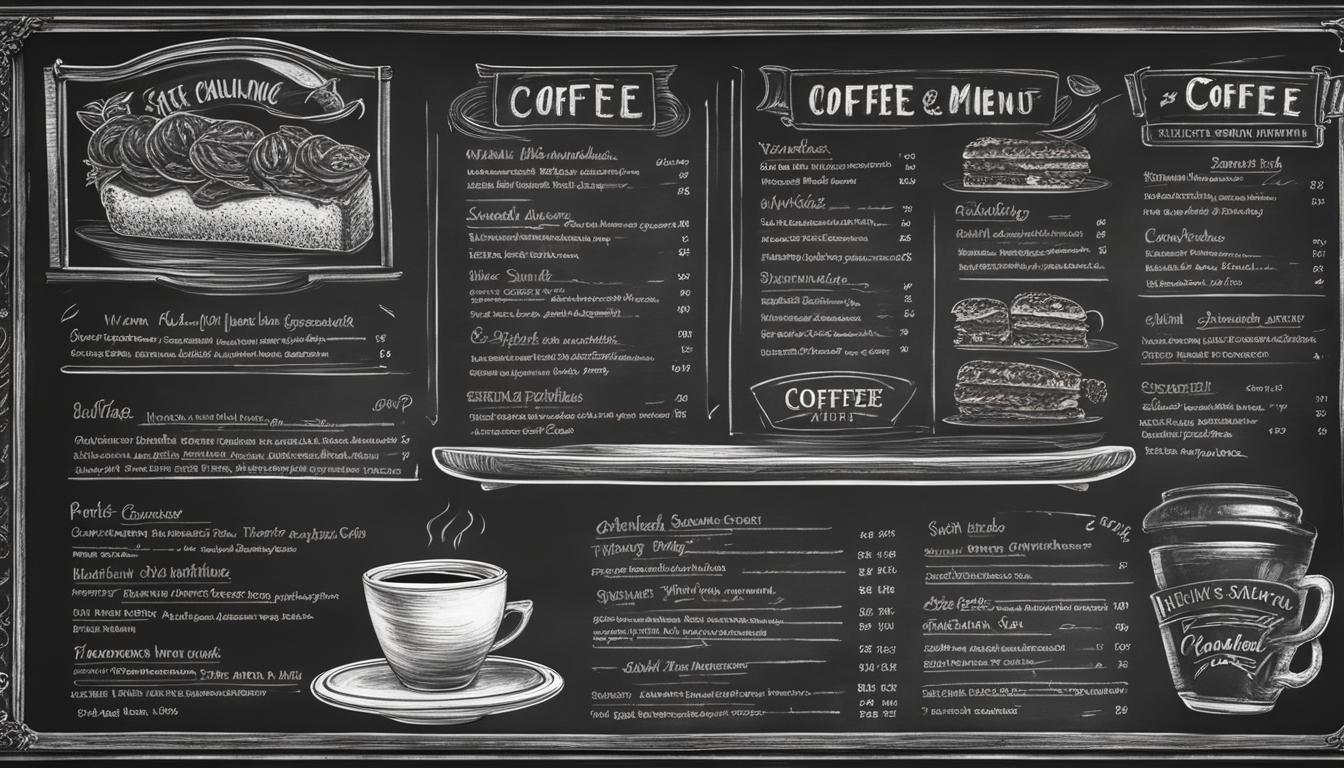In recent years, the UK has seen a growth in its café culture, with independent coffee shops gaining popularity. The café industry has the potential to create half a million new jobs by 2027. Starting your own café has become more accessible and affordable, thanks to advancements in technology like mobile card readers. However, it’s important to understand that consumer behavior has changed, with brand identity and aesthetic playing a significant role in purchasing decisions.
In this comprehensive guide, we will outline the essential steps you need to take to start a successful café or coffee shop business.
How to Start a Cafe in the UK?
The first step is to conduct thorough market research to understand the industry and your target market. By analyzing your competitors and customer preferences, you can define your unique value proposition and determine the feasibility of your café business.
Securing financing is another crucial step. Consider the costs of renting or buying a premises, purchasing equipment and supplies, as well as hiring and training staff. Explore funding options such as business loans, startup loans, or government grants to support your café venture.
Your café’s concept, branding, and design play a vital role in attracting customers. Determine the atmosphere you want to create and design a visually appealing brand identity that resonates with your target audience. Pay attention to the layout, lighting, and furniture of your café to create a welcoming environment.
Establishing an online presence is essential in today’s digital age. Create a professional website that showcases your menu, location, and unique offerings. Utilize social media platforms to engage with your target audience, share updates and promotions, and generate online buzz.
Before opening your café, ensure that you comply with all legal requirements. Register your business, obtain necessary permits and licenses, and adhere to health and safety regulations. It’s also important to invest in quality products and provide exceptional customer service to ensure the success of your café.
By following these essential steps, you can increase your chances of success in the competitive café industry. Good luck on your café venture!
The Importance of Market Research
When starting a café, market research plays a crucial role in ensuring your success. Understanding the overall industry landscape and how your business fits into it is essential. By conducting a thorough analysis of your target market, competitors, and customer preferences, you can make informed decisions that will guide your café’s direction.
One key aspect of market research is conducting a café feasibility study. This study helps you assess the viability of your business idea by considering factors such as location, target market demand, and competition. It allows you to identify potential challenges and opportunities, giving you a clearer picture of the market you’re entering.
Conducting a Feasibility Study
During the café feasibility study, you’ll evaluate various aspects of your business, including start-up costs. Assessing your financial requirements is crucial in planning and securing the necessary funding for your café. It involves considering expenses such as equipment, furniture, permits, licenses, and initial stock.
Additionally, a feasibility study helps you define your unique value proposition. It enables you to identify what sets your café apart from competitors, whether it’s through the quality of your menu offerings, pricing strategy, or exceptional customer service. By understanding your target market’s preferences and needs, you can tailor your café to meet their expectations.
Estimating Start-Up Costs
Estimating start-up costs is crucial for any café entrepreneur. This evaluation allows you to develop a comprehensive budget for your business plan. Start-up costs typically include expenses for:
- Lease or purchase of premises
- Renovations and decor
- Equipment and machinery
- Initial inventory and supplies
- Marketing and advertising
- Legal and licensing fees
- Registration and insurance
By conducting thorough market research and a feasibility study, you’ll be equipped with the necessary knowledge to make informed decisions about your café start-up. It will provide you with insights into market demand, help you estimate costs, and assist in defining your unique value proposition, setting you up for success in this vibrant and competitive industry.

Financing Your Cafe Business
Starting a café requires financial investment. To get your coffee shop startup off the ground, you’ll need to carefully consider the cafe start-up costs involved. Here are some key expenses to keep in mind:
- Premises: Whether you plan to rent or buy a location, be sure to budget for your cafe’s space. Consider factors such as location, size, and lease terms.
- Equipment: Coffee machines, refrigerators, ovens, and other necessary equipment can add up. Research suppliers and compare prices to find the best options that fit your budget.
- Furniture and Supplies: From tables and chairs to cutlery and crockery, outfitting your cafe with stylish and functional items can enhance your customers’ experience. Don’t forget to budget for ongoing supplies like coffee beans, milk, and packaging materials.
- Staffing: Hiring and training staff is an essential part of running a cafe business. Consider the wages, training costs, and potential benefits associated with your staffing needs.
Once you have a clear idea of your cafe start-up costs, it’s time to explore funding options. Here are a few common sources of financing for coffee shop startups:
- Business Loans: Banks and financial institutions offer loans tailored to small businesses. Look for competitive interest rates and favorable payment terms.
- Startup Loans: Specialized lenders and government-backed schemes may provide loans specifically for startups. Research eligibility criteria and application processes to find the best fit for your cafe business.
- Government Grants: Investigate whether there are any grants or funding programs available for new cafes in your area. These grants can provide financial support and help you get your venture up and running.
Managing your cafe’s finances is crucial for success. Consider using accounting software to track your income and expenses, create financial reports, and streamline your financial processes. This will enable you to make informed decisions and stay on top of your cafe’s financial health.
Developing Your Concept, Branding, and Design
Your café’s concept, branding, and design are critical to its success. The atmosphere you create should align with your target audience and set the tone for their experience. Paying attention to the visual aspects of your café can help attract customers and keep them coming back for more.
Determining Your Concept
Before diving into the branding and design process, it’s essential to establish the concept of your café. Consider the vibe and ambiance you want to create. Are you aiming for a cozy and rustic setting or a modern and sleek environment? Your concept should align with the preferences of your target audience and set you apart from competitors.
Crafting Your Brand Identity
Branding is more than just a logo. It encompasses the unique personality and values of your café. Take the time to develop a cohesive brand identity that reflects your concept and resonates with your target audience. This includes creating a memorable logo, choosing a color scheme that evokes the desired emotions, and designing attractive signage that catches the eye of passersby.
Designing an Inviting Space
Your café’s layout, lighting, and furniture should create a welcoming and comfortable environment for customers. Consider the flow of traffic, ensuring that there is ample space for customers to navigate the café without feeling cramped. Use lighting strategically to create a warm and inviting atmosphere. Select furniture that is both aesthetically pleasing and comfortable, allowing customers to relax and enjoy their time in your café.
“Your café’s concept, branding, and design should work together harmoniously to create a memorable and enjoyable customer experience.” – Jane Smith, Café Owner

Elements of Effective Café Design
| Aspect | Description |
|---|---|
| Layout | Consider the flow of traffic and ensure there is enough space for customers to move around comfortably. |
| Lighting | Use lighting strategically to create a warm and inviting atmosphere that complements your café’s concept. |
| Furniture | Select furniture that is visually appealing, comfortable, and enhances the overall ambiance of your café. |
| Decor | Add decorative elements that align with your concept and create an engaging visual experience for customers. |
By paying attention to these key elements, you can create a café that not only looks great but also provides a memorable and enjoyable experience for your customers.
Establishing Your Online Presence
In today’s digital age, having an online presence is essential for any cafe business startup. It’s your virtual storefront, providing potential customers with a glimpse into your offerings and creating a connection before they even step foot inside your establishment. To run a successful cafe, you need to establish a strong online presence that engages your target audience, generates buzz, and caters to customers’ convenience.
Creating a Professional Website
A professional website serves as the hub of your online presence, offering visitors a comprehensive view of your cafe’s menu, location, and unique offerings. Design a visually appealing and user-friendly website that reflects your brand identity, ensuring it is responsive and accessible across different devices and browsers. Optimize your website for search engines by incorporating relevant keywords, such as “cafe business startup” and “cafe opening guide,” to improve your online visibility.

Engaging on Social Media
Social media platforms provide a valuable opportunity to connect with your target audience and build a community around your cafe. Identify the platforms where your potential customers are most active, such as Instagram or Facebook, and create compelling and authentic content that showcases your cafe’s unique atmosphere, food and drink offerings, and customer experiences. Engage with your followers by responding to comments and messages promptly, and use relevant hashtags to expand your reach.
Generating Online Buzz
Get people talking about your cafe by leveraging online buzz. Collaborate with influencers or local bloggers to promote your offerings and share their experiences with their audience. Encourage your satisfied customers to leave positive reviews on platforms like Google My Business, Yelp, or TripAdvisor, which can greatly influence potential customers’ decision-making process. Participate in online communities and forums related to coffee or cafe culture, demonstrating your expertise and building your credibility.
Online Ordering and Delivery Services
To cater to customers’ convenience, consider investing in online ordering and delivery services. Partner with established platforms like UberEats or Deliveroo to expand your customer base and reach those who prefer to enjoy your offerings from the comfort of their own homes or offices. Ensure your online menu is up-to-date and features attractive food and drink images, enticing customers to place their orders online.
Running a successful cafe requires a strong online presence that engages and attracts customers. By creating a professional website, leveraging social media, generating online buzz, and offering online ordering and delivery services, you can establish a thriving digital presence for your cafe business startup. Embrace the power of the internet to connect with your target audience and grow your customer base.
Ensuring Legal Compliance
Before opening your café, it is crucial to ensure that you comply with all legal requirements. This section will guide you through the necessary steps to ensure your café startup is legally compliant and operates within the bounds of the law.
Registering Your Business
Start by registering your café business with the appropriate government authorities. This step is essential for establishing your legal identity and ensuring you meet the necessary regulatory requirements. By registering your business, you can operate with peace of mind, knowing that you are in compliance with the law.
Obtaining Permits and Licenses
Next, it is important to obtain the necessary permits and licenses for your café. These permits vary depending on your location and the specific services you offer. Examples of permits and licenses you may need include food preparation licenses, liquor licenses (if you plan to serve alcohol), and outdoor seating permits.
Meeting Health and Safety Regulations
Health and safety regulations are a vital aspect of running a café. Ensuring that your premises, equipment, and operations meet health and safety standards is crucial for the well-being of your customers and employees. Conduct regular inspections to identify and address potential hazards, and implement appropriate safety measures. Display prominently any health and safety certifications you receive.
Understanding Waste Disposal Regulations
An often overlooked aspect of café operations is waste disposal. It is important to understand local waste disposal regulations and ensure that your café follows proper waste management practices. This may include separating different types of waste, such as general waste, recyclables, and organic waste. Consider partnering with waste management services that can handle your café’s waste responsibly.
Obtaining Insurance Coverage
Protecting your business and employees with the right insurance coverage is essential. A comprehensive insurance policy can safeguard your café against unexpected events, such as property damage, liability claims, and employee injuries. Consult with an insurance professional to determine the appropriate coverage for your café.
Remember, ensuring legal compliance is not just about avoiding penalties and fines. It is about building a sustainable and trustworthy business that prioritizes the well-being of its customers and employees.
Providing Quality Products and Services
The success of your café relies heavily on the quality of the products and services you provide. Ensuring that your offerings meet high standards and exceed customer expectations is key to running a successful café.
Source quality ingredients and beverages: The foundation of any good café is the ingredients and beverages it uses. Source fresh and high-quality ingredients from reputable suppliers to maintain the integrity of your dishes and drinks. Customers appreciate the use of wholesome ingredients, and it can set your café apart from the competition.
Offer a diverse menu: Cater to different dietary preferences and ensure that your menu has options for everyone. Offer a variety of dishes that accommodate various dietary restrictions, such as gluten-free, dairy-free, and vegan options. Providing a diverse menu not only attracts a wider customer base but also shows that you are attentive to the needs of your patrons.
Maintain consistent taste and presentation: Consistency is crucial in the café industry. Ensure that your dishes and drinks are consistently prepared to the highest standards. Train your staff to follow recipes meticulously and deliver consistent taste and presentation. This consistency establishes trust with customers, who will return for the quality they have come to expect from your café.
Train your staff: Friendly and efficient customer service is an integral part of a successful café. Invest in staff training programs to ensure that your employees provide exceptional service. Train them in effective communication, problem-solving, and creating a welcoming atmosphere. Well-trained staff can help enhance the overall experience for your customers.
Continuously seek customer feedback: Actively solicit feedback from your customers to gauge their satisfaction and uncover areas for improvement. Encourage them to provide feedback through comment cards, online surveys, or social media platforms. Analyze this feedback to identify patterns and make necessary adjustments to meet customer needs and preferences.
“Customers appreciate the use of wholesome ingredients, diverse menu options, and consistent taste and presentation. Well-trained staff and continuous improvement through customer feedback are essential for running a successful café.”
By prioritizing quality products and services, you can create a café that attracts and retains loyal customers, setting the stage for long-term success.
Continue reading to learn more about the legal compliance required for opening a café in the UK.
Conclusion
Starting a café in the UK requires careful planning and execution. To increase your chances of success in the competitive café industry, there are several essential steps you need to follow.
First, conduct thorough market research to understand your target market, competitors, and customer preferences. This will help you define your unique value proposition and pricing strategy, ensuring your café stands out from the crowd.
Second, secure financing for your café business. Consider the costs of renting or buying a premises, purchasing equipment and supplies, and hiring and training staff. Explore funding options such as business loans and startup loans, and keep track of your finances using accounting software.
Third, focus on developing a strong concept and branding. Determine the atmosphere you want to create in your café and design a visually appealing brand identity. Pay attention to the layout, lighting, and furniture to create a welcoming environment for customers.
Establishing an online presence is another crucial step. Create a professional website to showcase your menu and location, and use social media platforms to engage with your target audience. Consider offering online ordering and delivery services for added convenience.
Lastly, ensure legal compliance by registering your business, obtaining permits and licenses, and meeting health and safety regulations. Prioritize quality products and exceptional customer service to build a loyal customer base.
Remember, success in the café industry requires continuous adaptation to changing customer preferences and market trends. Best of luck on your café venture!




